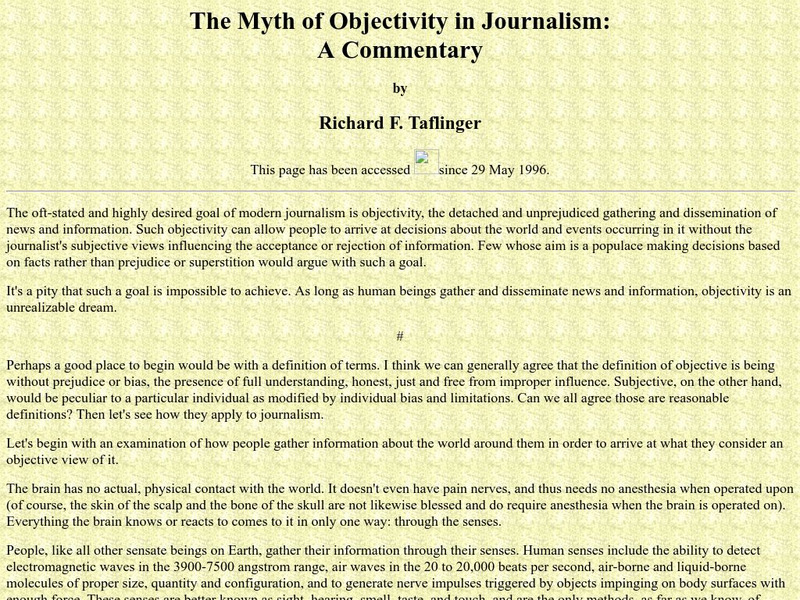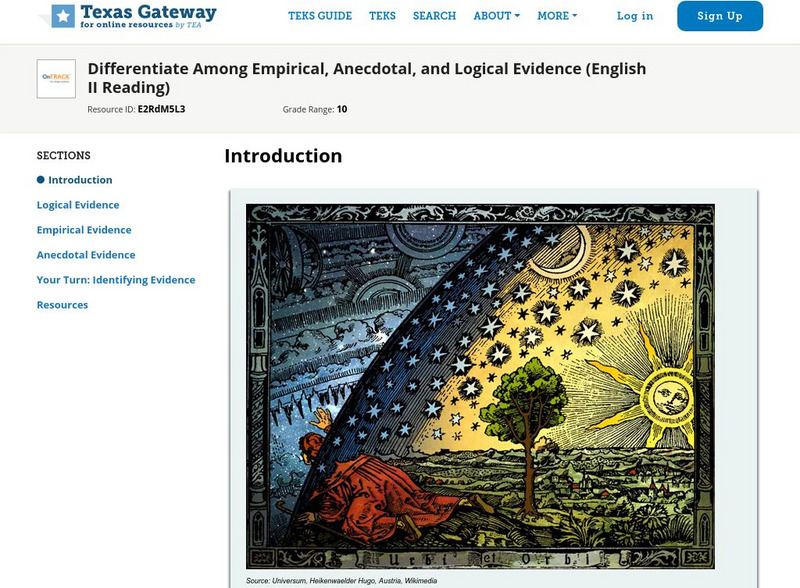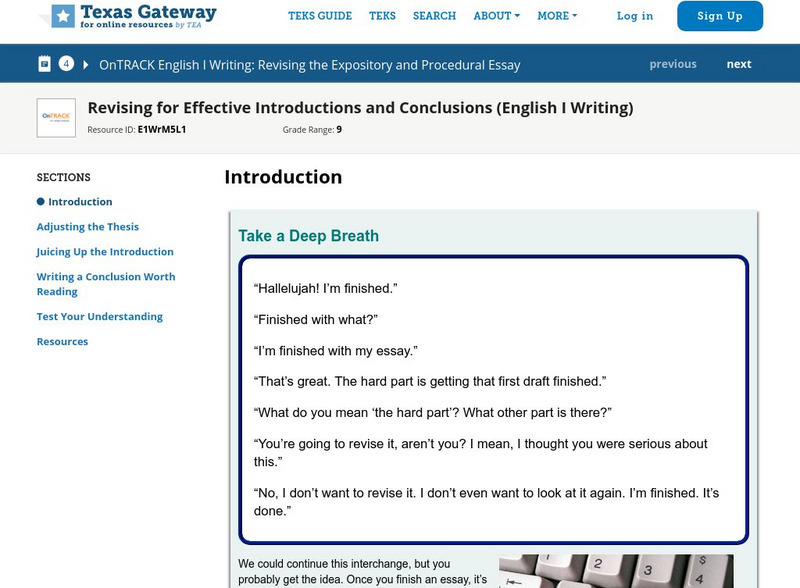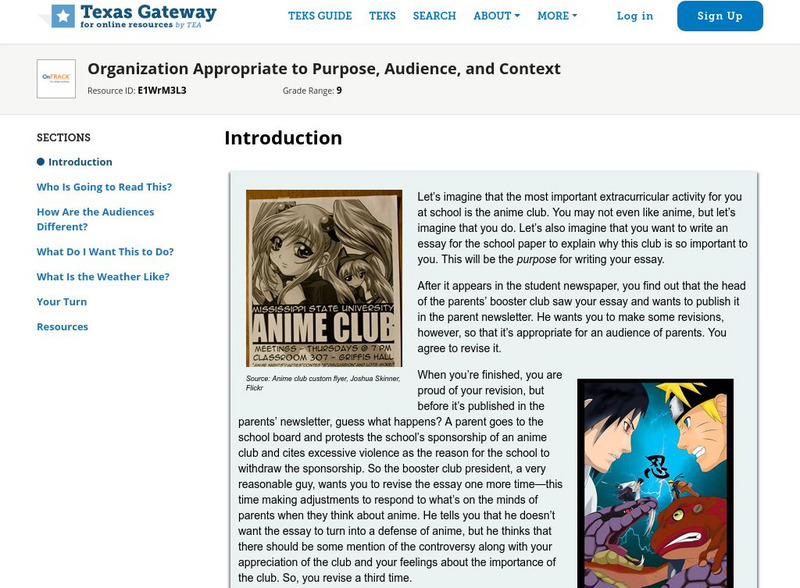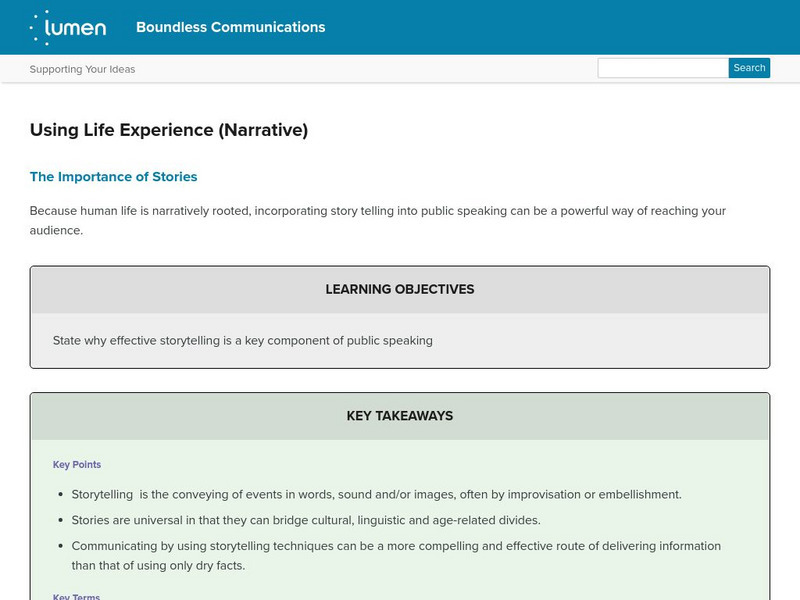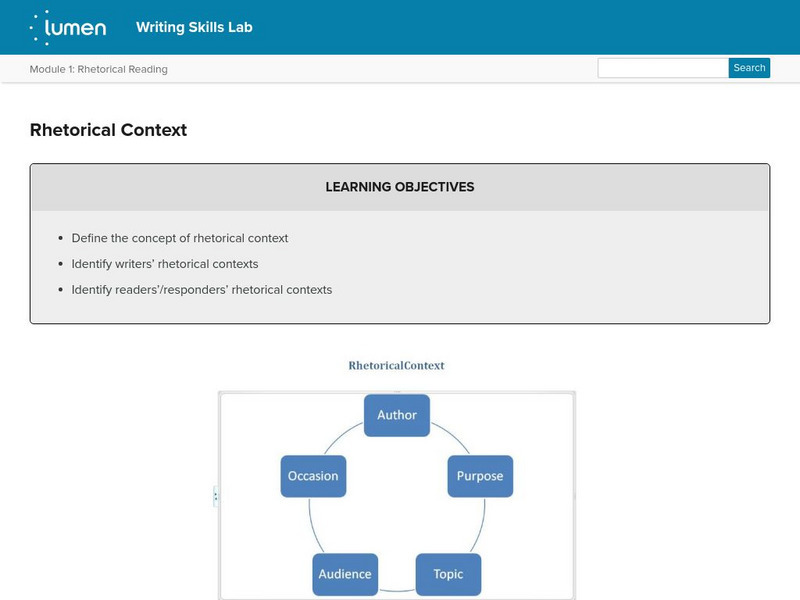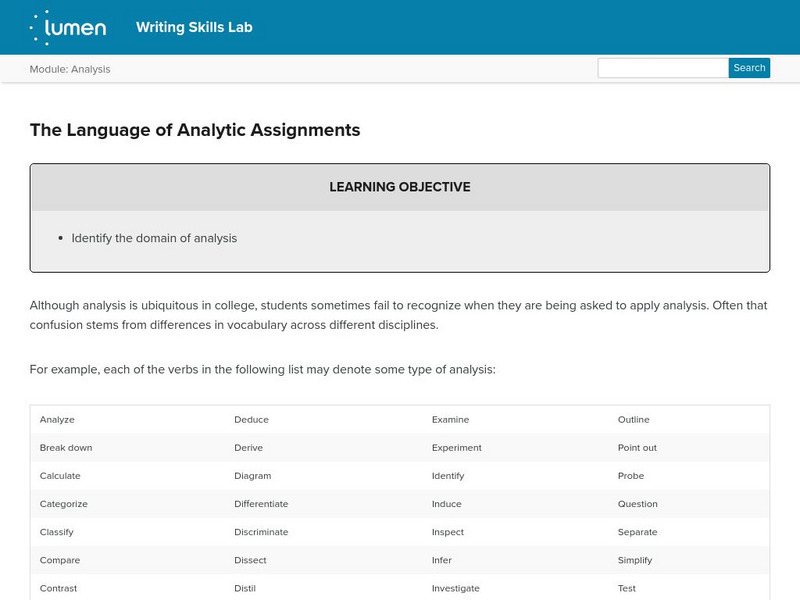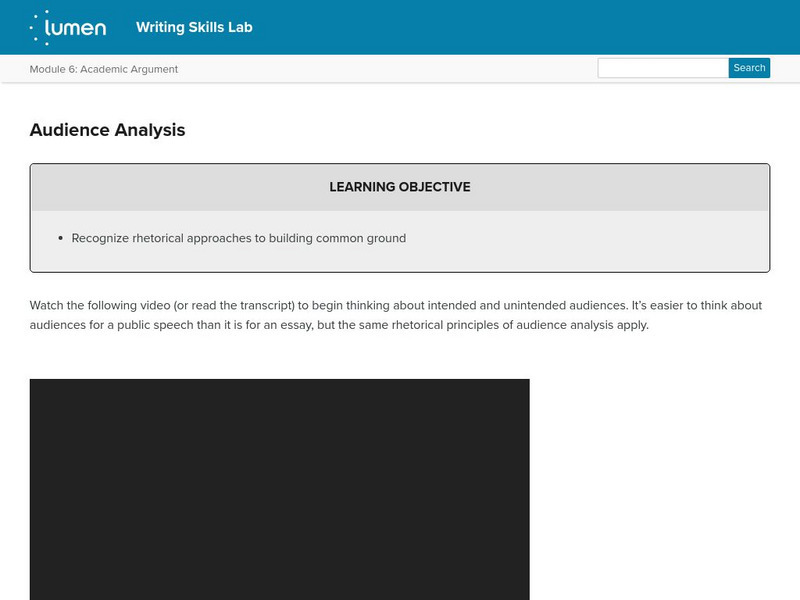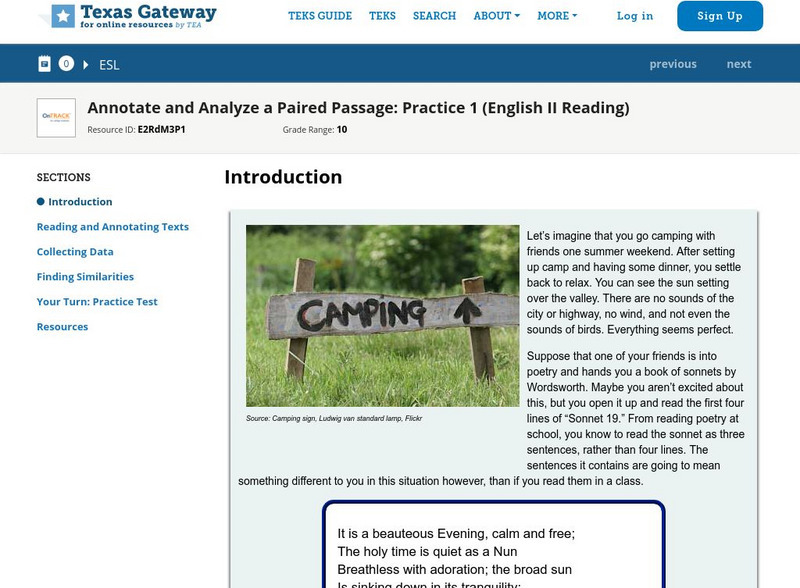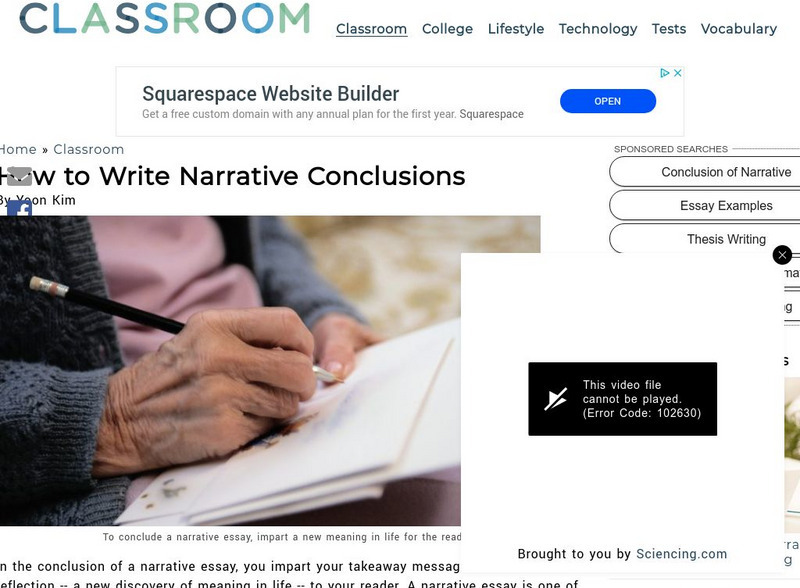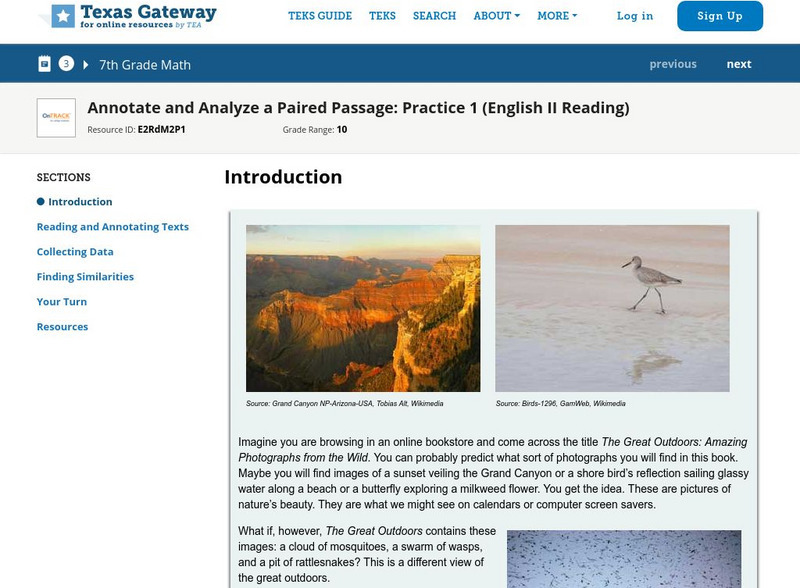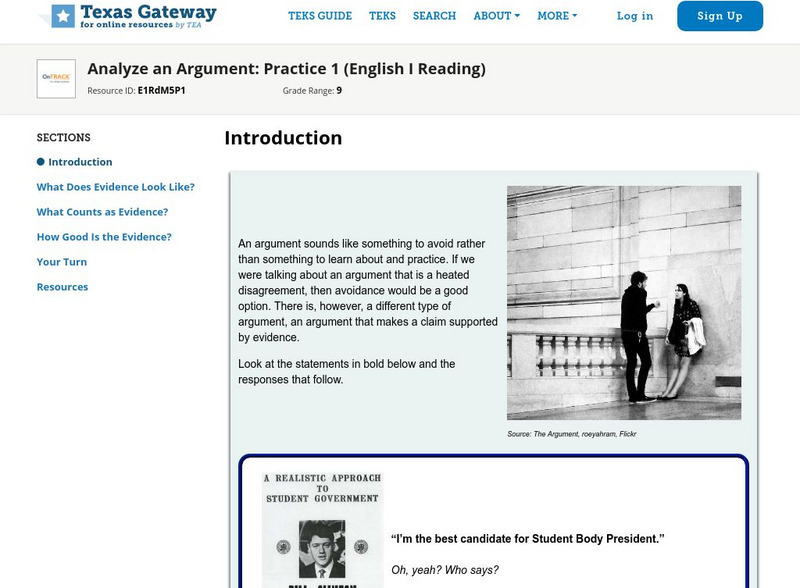Washington State University
Washington State University: The Myth of Objectivity in Journalism, a Commentary
Scholarly discussion of objectivity and subjectivity as it exists, according to the author, in the world of journalism. Promotes critical thinking about how the news is gathered, written, and disseminated.
Texas Education Agency
Texas Gateway: Relevant Evidence and Well Chosen Details (English Ii Writing)
[Accessible by TX Educators. Free Registration/Login Required] Write an essay that contains relevant evidence and well-chosen details.
Texas Education Agency
Texas Gateway: Analyze Shifts in Perspective in Informational/persuasive Text
[Accessible by TX Educators. Free Registration/Login Required] Explain shifts in perspectives in the same argument and make decisions about support used in those arguments.
Texas Education Agency
Texas Gateway: Differentiate Among Empirical, Anecdotal, and Logical Evidence
[Accessible by TX Educators. Free Registration/Login Required] Distinguish among different kinds of evidence in a text that supports conclusions and arguments in texts.
Texas Education Agency
Texas Gateway: Analyze an Argument: Practice 1 (English Ii Reading)
Analyze the quality, relevance, and credibility of evidence that supports or opposes an argument.
Texas Education Agency
Texas Gateway: Analyze Famous Speeches for Rhetorical Structures and Devices
Analyze the persuasive impact of rhetorical structures and devices in famous speeches.
Texas Education Agency
Texas Gateway: Revising the Persuasive Essay: Purpose, Audience, and Context
[Accessible by TX Educators. Free Registration/Login Required] Learn strategies for evaluating and revising the organization of an essay, including purpose, audience, and context.
Texas Education Agency
Texas Gateway: Revising for Effective Introductions and Conclusions
[Accessible by TX Educators. Free Registration/Login Required] Learn strategies for evaluating and revising an introduction, conclusion, and controlling idea or thesis in an essay.
Texas Education Agency
Texas Gateway: Close Reading of Prose: Practice 2 (English Ii Reading)
Read carefully in order to identify diction, tone, and irony, and evaluate their impact on the meaning of a text.
Texas Education Agency
Texas Gateway: Organization Appropriate to Purpose, Audience, and Context
[Accessible by TX Educators. Free Registration/Login Required] Write an essay that is organized appropriate to audience, purpose, and context.
Lumen Learning
Lumen: Boundless Communications: Using Life Experience (Narrative)
This lesson focuses on using narratives or stories in speeches. It discusses the importance of stories, the power of storytelling, and how and when to use stories in speeches.
Lumen Learning
Lumen: Rhetorical Reading: Rhetorical Context
This lesson focuses on rhetorical context including defining it, questions to ask to understand it, and how it can be useful to the reader and responder.
Lumen Learning
Lumen: Rhetorical Reading: Putting It Together: Rhetorical Reading
This is a summary of the previous lessons having to do with rhetorical reading including rhetorical context, previewing text, actively reading, using context clues, and reading voraciously.
Lumen Learning
Lumen: Analysis: The Language of Analytic Assignments
This lesson focuses on understanding the language of assignments that indicate the need or analysis including a list of verbs that denote the need for analysis and assignments that ask you how the parts relate to the whole, how something...
Lumen Learning
Lumen: Analysis: Rhetorical Analysis
This lesson focuses on defining rhetorical analysis and identifying and applying different types of analytic processes. It also provides a practice activity.
Lumen Learning
Lumen: Writing Skills: Audience Analysis
This lesson focuses on audience analysis and recognizing rhetorical approaches to building common ground. A practice activity is provided.
Other
Ncsall: Relationship Between Reading and Speaking
The interview discusses the relationship between reading and speaking.
Ohio University
Ohio.edu: Point of View and Narrative Voice
This is an article defining point of view, explaining the types of point of view, and discussing voice and tone. It was originally published at http://teenwriting.about.com/library/weekly/aa111102e.htm.
Texas Education Agency
Texas Gateway: Annotate and Analyze a Paired Passage: Practice 1
Students practice annotating and analyzing paired passages.
Leaf Group
Classroom: How to Write Narrative Conclusions
This article focuses on how to write conclusions for narratives by sharing a takeaway message, a lesson or a reflection -- a new discovery of meaning in life -- for your reader. W.9-10.3e Conclusion, W.11-12.3e Narrative Conclusion
Better Lesson
Better Lesson: Revising Our Argument for Presentation Part 1
Students will compare and contrast the written form of Sojourner Truth's "Ain't I a Woman" to a live reading of the poem by an actress. Follow-up activities provided.
Texas Education Agency
Texas Gateway: Annotate and Analyze a Paired Passage: Practice 1
In this lesson, you will read and annotate a pair of texts to make inferences, draw conclusions, and synthesize ideas and details using textual evidence. Prepare to get involved in a conversation between you and the two texts you will be...
Texas Education Agency
Texas Gateway: Analyze an Argument: Practice 1 (English I Reading)
In this lesson, you are going to practice analyzing the evidence that supports or opposes an argument. You are also going to learn to analyze the quality, relevance, and credibility of the evidence so you can decide whether to accept the...
The Washington Post
Washingtonpost: Rewriting the Rules
Washington Post article dealing with ethics and guidelines of journalists reporting hard news. Provides material for debate and discussion. Interesting article.


